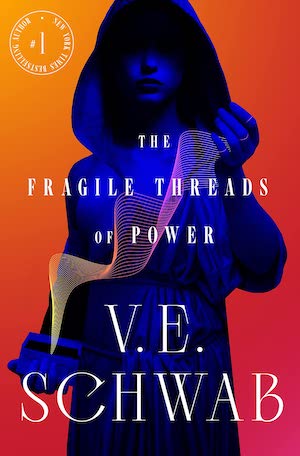I would love to be at a bar when the fifty-Feegle-in-a-trenchcoat saunters in…
Summary
Petulia takes Tiffany to meet the other girls, who are all led (and constantly belittled) by Annagramma Hawkins. They tell her about the Witch Trials, a yearly fair where the witches meet to show each other what they’ve been working on. Annagramma is apprenticed to a witch who wants the practice to move “forward,” spells magic with a “k” and thinks that Granny Weatherwax is a fossil. Tiffany tells them of her encounter with Granny and how the woman gave her the hat on her head—which, of course, none of them can see. They all laugh and Tiffany returns to Miss Level’s humiliated. The witch tries to talk to her, but Tiffany can’t manage to talk just yet. Miss Level leaves dinner and goes back downstairs. Tiffany cries and feels terribly homesick. She wonders if she’s even a witch at all, knowing she’s so different and being uncertain of the training she’s receiving. She casts the See Me spell to be certain that her hat is truly there, and when she does it, the hiver moves in to her and becomes her. Jeannie uses the items given by her mother to make an ancient cauldron, drinks from it, and tries to look into the memories of previous keldas. She realizes the hiver has Tiffany. Tiffany wakes feeling ready to take charge; the curse nets at Miss Level’s have exploded and Oswald has run away.
Buy the Book


The Fragile Threads of Power
Miss Level and Tiffany go on their usual rounds through the village, which Tiffany hates. She begins to remember lives that aren’t her own, and Miss Level’s other self arrives on a broom to get Tiffany home, wondering if she’s ill. Tiffany begins to use magic to make things explode, to make cheese, and wonders why witches are afraid of doing real magic. She gets on the broom she’d been afraid of and leaves. The Feegle arrive and know the hiver is in Tiffany, but can tell that she’s still fighting it. Miss Level spots them and they have a chat with her about Tiffany and the hiver, where they come from and what they do to people. Miss Level insists that it doesn’t make sense for the hiver to take her over because Tiffany can’t do magic—until Big Yan explains the See Me trick, and Miss Level realizes that Tiffany has figured out how to do Borrowing far too early without ever learning to protect herself when she does it. Tiffany (who is truly the hiver) flies to Miss Earwig’s house and asks to see Annagramma. She threatens the girl, then demands an alliance, and asks where her clothes come from. They go to Zakzak Stronginthearm’s shop, where she menaces the dwarf and then turns his wizard Brian into a frog.
Far away, Granny Weatherwax, Borrowing a hive of bees, bolts upright, realizing what’s happened to Tiffany. Back at the cottage Tiffany returns with her purchases, and Miss Level realizes that she stole money from Mr. Weavall. Upstairs, the hiver is trying on clothes, giving Tiffany the chance to use See Me and Borrow her body back. They fight one another and when half of Miss Level comes into the room, the hiver turns and kills her. The other body wakes alone and the Feegle get her to Tiffany’s room and try to get her help. The Feegle note that with all her new purchases, Tiffany’s still wearing the necklace Roland gave her—that will be the tether they need to find in her mind. The Feegle enter it, and find the Chalk and Granny Aching’s hut. Billy believes that when the sun sets here, Tiffany’s soul will die, so they get the idea to find the hiver and bring it to this part of Tiffany’s mind, the part that’s hers, where she can fight it. A message is drawn in chalk, asking for sheep’s wool, turpentine, and Jolly Sailor tobacco. Rob decides to stay with Tiffany and sends the group to fetch those things and make the cottage smell of them. Thornbushes begin growing in Tiffany’s mind and Rob attacks them, while the rest of the group gather the needed items from locals.
They set all the items below Tiffany’s nose so she can smell them. The hiver arrives in this part of Tiffany’s mind and the Feegle show up to fight it. As they’re fighting, the land begins to sit up—the land is Tiffany. She evicts the hiver just as someone knocks on Miss Level’s door. Tiffany wakes and remembers being the hiver and all its memories. She’s grabbed and taken outside and slapped anytime she takes on the hiver’s memories instead of her own. Eventually, Tiffany says her own name and sees that it’s Mistress Weatherwax tending to her. She’s taken inside and Miss Level wakes and insists to Tiffany that the death of half of her is not the young girl’s fault. She then prepares tea… with all four of her arms, though two aren’t truly there anymore. When she notices, Mistress Weatherwax gets her to use those other arms intentionally and own this new state of affairs. Oswald returns, and Granny takes Tiffany out on Miss Level’s usual rounds. As they walk, Granny tells Tiffany that they sent her to Miss Level because she’s best at the real parts of witching, the parts that deal with people and their problems. Then she winds Tiffany up to get her angry because she knows the hiver is still out there and wants Tiffany to be ready for it.
Commentary
Let’s dig into the narrative purpose of the hiver, because it really is a great monster for the purposes of this story.
So, there’s that bit you do in fantasy narratives, where a magical thing or being is usually some kind of allegory or stand-in for a real-world issue or problem. The really talented writers can seamlessly get the fantasy thing-or-being to be both allegorical and distinctly interesting in its own right. If they’re even more skilled, the fantasy aspect of the thing/being comes with its own set of themes and ideas to thicken the narrative soup, as it were, and the allegory doesn’t whack you over the head.
And Tiffany is at such a perfect age for this particular lesson.
Of course, Granny gets into it when Tiffany asks her why she was sent to study with Miss Level, but the piece where the hiver has taken over Tiffany’s mind is really doing the brunt of the work here as it thinks (for Tiffany, as Tiffany) of hating all these people and their petty, ignorant problems. The hiver is not truly Tiffany, but its use of her permits behavior that she would never enact on her own, thoughts that she doesn’t want to entertain. And it’s ultimately hitting on an important revelation that many people are never fortunate enough to have: The idea that living a good life often means doing for others, even when it feels fruitless or boring or tedious.
Granny calls this the “heart and soul” of witching, but then Esme Weatherwax isn’t just the witch of all witches—she’s one of Pratchett’s most noble protagonists. She’s a better “good guy” than any of them, up to and including Carrot. She’s not just helping to teach Tiffany how to be a good witch; she’s teaching her how to be Good with the capital ‘G.’ And she knows that Tiffany needs that lesson because the girl is already wielding her kind of abilities with practically no training at all.
In Pratchett’s worldview as set down by the Discworld books, true goodness is determined by caring for others—even when you may not like them. Even when they don’t offer the same care to you in return. And that could sound kinda martyr-y turned on its side, but I don’t believe that’s what Granny’s philosophy is intended to invoke. For one, we know that she struggles with a desire to do bad on a regular basis, to become like her sister. Moreover, Granny is a big believer in being responsible for yourself: After all, the only thing you can control in your life (for a very thready definition of control, at that) is you. So the point is really more, be good because there’s no damn sense in adding to the badness in the world.
The hiver doesn’t understand any of this because it is (on a meta level) ultimately a device used to explore Tiffany’s same lack of understanding. Most of what the creature does from a narrative perspective is give voice to her worst impulses, despite technically not being her. And this forces Tiffany to confront those meaner pieces—not because they’re shameful, but because she’s still so young that she doesn’t really understand what they mean.
But, of course, now that the hiver has done its work as a plot device, we get to the clever bit where it becomes more…
Asides and little thoughts:
- I can be (unfortunately) pretty contrarian by nature, but I’m sure nearly every human being has had the Petulia impulse to revamp an entire train of thought on learning that your companion feels the opposite from you. Sometimes you just really need folks to connect with you, and if the point isn’t too dour, it’s not a big deal to one-eighty and say Actually, I love turnips! Silly me. (I do like turnips, don’t come after me, turnip advocates.)
- The fact that Annagramma’s teacher insists on calling it magik with a ‘k’ tells you everything you need to know, and is such a powerful jab at a certain brand of Wicca that Pratchett loves to tease.
- Thing is, we had a person turned into a frog in Witches Abroad and there were no terrible pink balloon bits left over as far we know… wonder why? (I do love/hate the idea of needing to do something else with the extra matter…)
- Love the detail about the hiver-pretending-to-be-Tiffany-in-her-brain being slightly taller because she thinks she is slightly taller.
Pratchettisms:
“Tiffany Aching?” said Tiffany, and found herself saying her name as if she was asking permission to have it.
Long years of juggling had given Miss Level a grip like steel.
There were lots of crescent moons and young women with quite frankly not enough clothes on, and big men with horns and, ooh, not just horns.
The mug was chipped, and on it were the jolly words YOU DON’T HAVE TO BE MAGIC TO WORK HERE BUT IT HELPS!
This is the house of a life peeled to the core.
In fact Tiffany, who cared a lot about getting words right, would have said it was a hush, which is not the same as silence. A hush is what you get in cathedrals at midnight.
The nose is a big thinker.
The black-dressed figure holding her wasn’t tall, but she was so good at acting as if she was that it tended to fool most people.
Next week we’ll finish the book!










